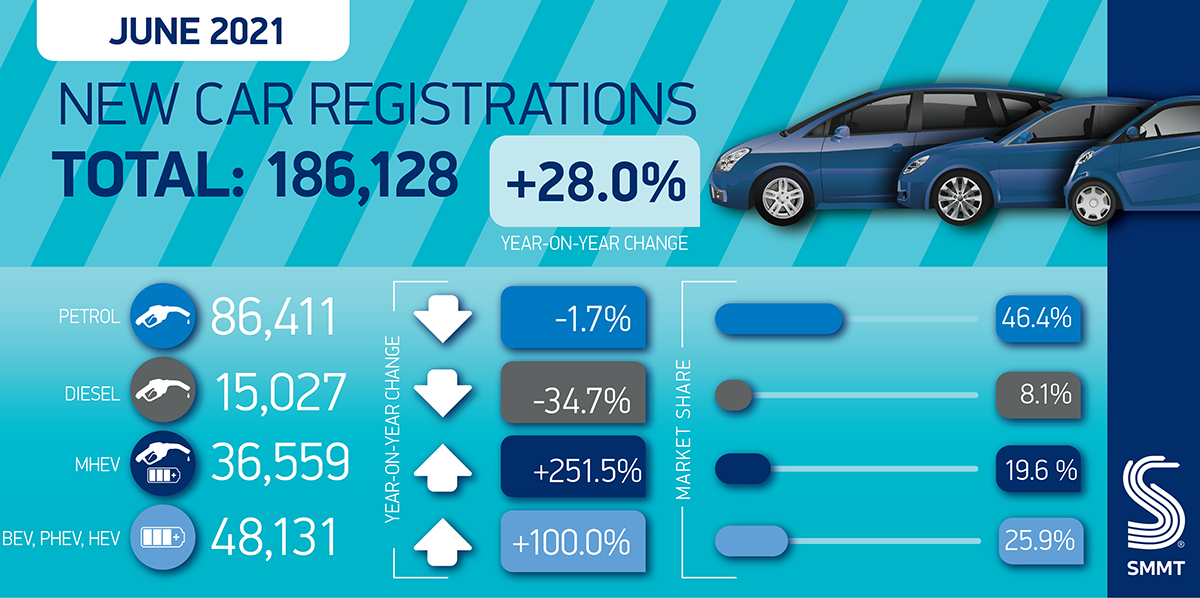
New car registrations in June grew 28% year-on-year to 186,128, according to the Society of Motor Manufacturers and Traders (SMMT)’s latest figures, as consumers made up for lost time during lockdown, but a number of factors are putting a long-term recovery at risk.
SMMT cautioned that the monthly performance was again artificially lifted through comparison with June 2020, when the UK began to emerge from the first pandemic lockdown and showrooms in England opened up at the beginning of the month.
However, compared with the previous 10-year June average, monthly registrations were down by 16.4%, while total registrations for Q2 2021 fell short of industry expectations by around 9,000 units partly as the ongoing global semiconductor shortage acted as a limiting factor on supply. As a result, overall registrations for the first half of the year are down by 26.8%.
Plug-in vehicles continued to increase market share, with battery electric (BEVs) accounting for more than 10% of registrations. PHEV uptake, however, continued to grow faster than BEV uptake for the third month running, following reductions to the Plug-in Car Grant in March. BEVs and plug-in hybrid vehicles (PHEVs) combined accounted for 17.2% of new vehicles hitting the road (31,981 units).
Private registration numbers were positive but subdued compared to large fleets, reflecting an ongoing trend for the year with consumer uptake increasing 30.6% year on year, compared to 47.8% for fleets.
The SMMT noted that while economic confidence continues to strengthen, new registrations still remain adrift of pre-pandemic levels. Returning to the previous decade average of 2.3 million new car registrations per annum, and for that total to be electrically-driven, consumers need certainty about the future with long term government commitments to incentives, and confidence in the rollout of charging infrastructure nationwide, the organisation said.
Mike Hawes (pictured), SMMT Chief Executive, commented: “With the final phases of the UK’s vaccine rollout well underway and confidence increasing, the automotive sector is now battling against a ‘long Covid’ of vehicle supply challenges. The semiconductor shortages arising from Covid-constrained output globally are affecting vehicle production, disrupting supply on certain models and restricting the automotive recovery. However, rebuilding for the next decade is now well underway with investment in local battery production beginning and a raft of new electrified models in showrooms.
“With the end of domestic restrictions later this month looking more likely, business and consumer optimism should improve further, fuelling increased spending, especially as the industry looks towards September and advanced orders for the next plate change.”

Long-term impact
In its analysis of the new car market, Cox Automotive Europe forecast challenging conditions going forward, saying there are several headwinds yet to be felt fully across the new vehicle supply chain which could result in further market decline.

Philip Nothard, Insight and Strategy Director at Cox Automotive, said: “For instance, the true impact of Brexit is yet to be felt. The automotive industry within the UK and globally is having to change and rethink distribution strategies. This can lead to a delay in the movement of goods into the UK. In addition, there are pending issues facing manufacturers because there will be new vehicle tariffs applied to new cars coming into the country when production does catch up.
“There’s also the planning or adaption of agency model strategies by vehicle manufacturers in the sales process of new cars. Consumers are increasingly buying online which also extends to cars for those who decide not to follow the traditional sales process in dealerships. The pandemic has given manufacturers and dealers time to reflect on how they sell cars and the increasing ways that it can take place.”
Nothard also points towards manufacturers’ electrification strategies having a profound impact on new vehicle registrations - the latest SMMT figures showed June’s best-selling new car was the electric Tesla Model 3.
“Manufacturers will be conscious of the imminent introduction of fines for those who breach Corporate Average Fuel Economy (CAFE) regulations – which will push traditional OEMs towards the EV market. In addition, we’re likely to see more EVs topping the vehicle registrations list in future, as many OEMs use raw material shortages to accelerate the transition away from ICE (internal combustion engine) to EV.
“This disruption is likely to keep the used vehicle market continuing its upward trajectory in terms of vehicle prices and demand. The bottom line is that although both the retailers and OEMs face supply
challenges, they will remain focused on annual market shares in each global market and position against their peers,” he said.
Nothard believes new car supply pressures will continue to be felt into 2022 and fuel the current used car price boom. However, he predicts that the situation will stabilise as winter arrives, furlough ends, and the economy opens – causing consumers to spend their money elsewhere and subsequently allowing the government to begin recouping loans.
“It’s a great time to be selling a used car as they will fetch higher prices, but not so much to buy one. Also, it’s also not great news for dealers operating within the current or expanding ULEZ areas in London. Trying to sell a non-compliant petrol or diesel car within this area will be more difficult.”





